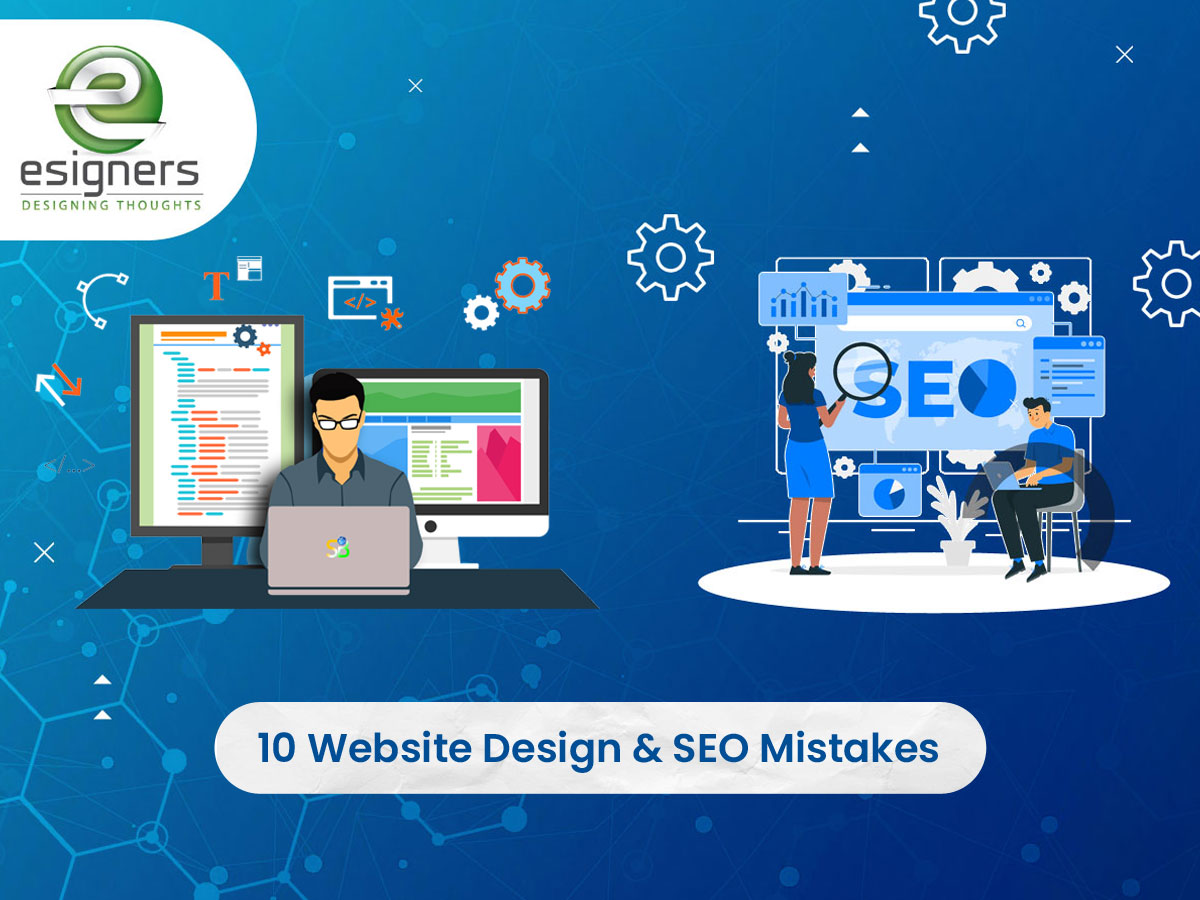Blog
10 Website Design and SEO Mistakes

July 15th, 2024 by esigners
Here are ten common website design and SEO mistakes that can impact your site’s performance and user experience.
A design that does not respond
PCs (personal computers) still rule the roost when it comes to conversions but these days, more people are using mobile devices than them. Mobile could be your first point of contact with a buyer. Just use mobile first indexing in the mix because these days it is really important! When your website offers a great mobile experience it also makes a great first impression on people. The website should be responsive at the very least. An even better thing to do in these cases would be to design the site exclusively for mobile devices.
A site that loads slowly
People often exit websites or close them because they are exasperated at how long it takes to load. You can be sure that do not want that to happen to your website as well. The possible causes for these could be enumerated as below:
- bad hosting
- wrong image optimization
- wrong database optimization
- lack of caching
- too many HTTP (Hypertext Transfer Protocol) requests
- too much traffic for your hosting package
Bad hosting
You may think of firing your developer because the site is loading slowly but prior to that evaluate how well the host is doing. Always treat affiliated reviews and recommendations with care because they get paid rather well by hosting service providers. Just because you have chosen a big name do not assume that it would automatically guarantee great performance as well! The new service provider could be owned by the same owner, who knows? Know and understand that complete service outages are bigger issues than site speed.
Problems with usability and navigation
What happens when a visitor has researched and wants to buy from you but cannot find the sales page? You may think that this is crazy but this can jolly well happen to you! So, always ensure that the following are easily available on your website:
- sales pages
- contact details
- about us
- blogs
- a 404 page
Poorly structured URLs (Universal Resource Locators)
Make sure that your website URLs are readable and have the necessary keywords. If it applies to your website, they should cascade via subcategories and categories to the final specific item or subject.
Lack of metadata and text
If your site cannot be read by search engines they would not know if anyone else will at all be interested in them. This means that they would not direct anyone to your site. If you are paying for traffic this should not bother you too much but in case you want visitors for free you must use keyword research, SEO, and great content.
Lack of analysis and optimization
Before you get started with the website begin by analyzing traffic, consumer demographics, and conversions. If your site does not already feature analytics it is time that it did. The best options you have in this regard may be enumerated as below:
- Google Analytics
- Facebook Pixel
- Crazy Egg
- Split Testing
- visitor feedback forms
- bot or live chat
Analyze to find out if every page is fulfilling its purpose or not.
Security Issues
Take the security of your website and the people who visit it seriously. If you are using WordPress keep the plugins to a minimum and keep them updated at all times. Use premium plugins and themes as they reduce the chance of your website being affected by malicious codes.
Not gathering emails
You do not have to stuff popups in your visitors’ faces straightaway. However, if you use the likes of content signup forms and exit popups correctly they will work well for you. You can also use lead magnets such as free reports, tools, trials, and discounts. Remember that you are leaving money on the table if you are not collecting contact details.
Lack of rich snippets
If you want an unfair advantage in the context of search click-through you should try using rich snippets. Using them will make sure that your site is doing well and ranking high on SERPs (Search Engine Results Pages). There is perhaps no website owner who does not want this in the world, right?
The digital landscape is always evolving and as such your website acts as the central hub of the online presence of your brand. However, a lot of businesses fail to fulfill their true potential by making the mistakes we have talked about over here.
